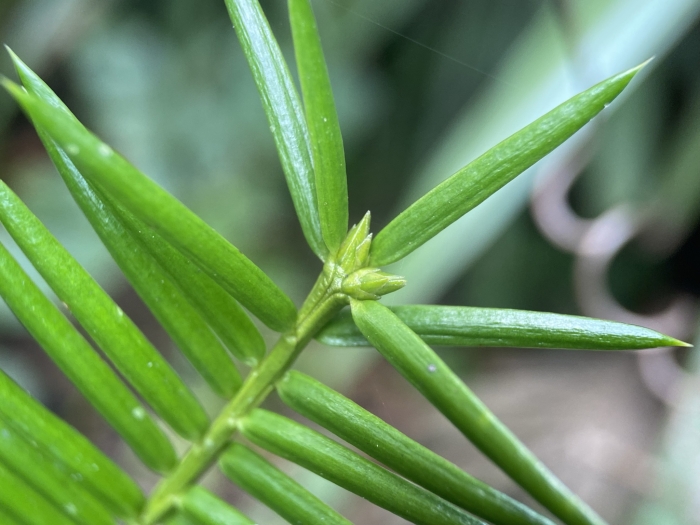Florida Nutmeg
(Torreya taxifolia)
Florida Nutmeg (Torreya taxifolia)
/
/

Matt Berger
CC BY 4.0
Image By:
Matt Berger
Recorded By:
Copyright:
CC BY 4.0
Copyright Notice:
Photo by: Matt Berger | License Type: CC BY 4.0 | License URL: http://creativecommons.org/licenses/by/4.0/ | Rights Holder: Matt Berger | Publisher: iNaturalist | Date Created: 2021-08-24T14:06-07:00 |















Estimated Native Range
Summary
Torreya taxifolia, commonly known as Florida Nutmeg, is an evergreen tree native to ravine slopes and bluffs along rivers in Florida and Georgia. It can reach heights of up to 18 meters (59 ft) with an 80 centimeters (31 in) diameter trunk, but more commonly it grows to 9–12 meters (30–39 ft) tall with a trunk diameter of 30–50 centimeters (12–20 in). Many current populations consist of immature trees less than 3 meters (9.8 ft) tall. The crown is open and conical, with whorled branches. The leaves emit an unpleasant, strongly pungent, resinous odor when crushed. Florida Nutmeg is dioecious, meaning there are separate male and female plants. The seeds are enclosed by a fleshy aril, which is atypical compared to true yews where the aril forms a cup around the seed.
Florida Nutmeg is valued for its unique foliage and the historical use of its seeds, which resemble nutmeg and were used as a substitute during the Civil War. It is planted as an ornamental in private gardens, arboreta, and botanical gardens. This species prefers part shade and medium water, with well-drained soils. It is not commonly found in urban settings due to its specific habitat requirements and slow growth rate. Florida Nutmeg is susceptible to a fungal blight, which has caused a significant decline in its wild populations, making it a critically endangered species. Cultivation should be approached with care to avoid spreading this disease.CC BY-SA 4.0
Florida Nutmeg is valued for its unique foliage and the historical use of its seeds, which resemble nutmeg and were used as a substitute during the Civil War. It is planted as an ornamental in private gardens, arboreta, and botanical gardens. This species prefers part shade and medium water, with well-drained soils. It is not commonly found in urban settings due to its specific habitat requirements and slow growth rate. Florida Nutmeg is susceptible to a fungal blight, which has caused a significant decline in its wild populations, making it a critically endangered species. Cultivation should be approached with care to avoid spreading this disease.CC BY-SA 4.0
Plant Description
- Plant Type: Tree
- Height: 40-50 feet
- Width: 20-30 feet
- Growth Rate: Moderate
- Flower Color: N/A
- Flowering Season: Spring
- Leaf Retention: Evergreen
Growth Requirements
- Sun: Part Shade
- Water: Medium
- Drainage: Medium
Common Uses
Potted Plant
Natural Habitat
Native to ravine slopes and bluffs along rivers in Florida and Georgia
Other Names
Common Names: Florida Nutmeg Tree , Florida Torreya , Gopherwood , Stinking Cedar , Stinking-Cedar , Eibenblättrige Torreya , Cèdre Puant , Cèdre À Feuilles D’If , Torréya De Floride , Торрея Тисолистная (Torreya Tisolistnaya)
Scientific Names: Torreya taxifolia , Tumion taxifolium , Taxus montana , Caryotaxus taxifolia , Foetataxus montana , Foetataxus taxifolia
GBIF Accepted Name: Torreya taxifolia Arn.